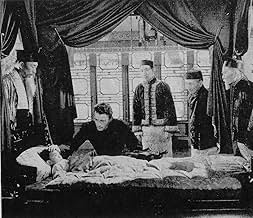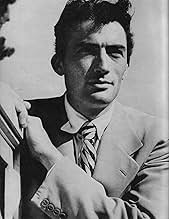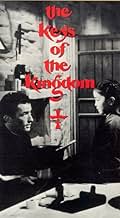VALUTAZIONE IMDb
7,2/10
3287
LA TUA VALUTAZIONE
Un giovane sacerdote viene inviato in Cina per fondare una parrocchia cattolica.Un giovane sacerdote viene inviato in Cina per fondare una parrocchia cattolica.Un giovane sacerdote viene inviato in Cina per fondare una parrocchia cattolica.
- Regia
- Sceneggiatura
- Star
- Candidato a 4 Oscar
- 2 vittorie e 5 candidature totali
Rose Stradner
- Rev. Mother Maria-Veronica
- (as Rosa Stradner)
Cedric Hardwicke
- Monsignor at Tweedside
- (as Sir Cedric Hardwicke)
Recensioni in evidenza
What a wonderful story of a man, despite much adversity, contributes himself to the Chinese community he loves so much. It is amazing how Peck makes it so effortless (even in his only second film)in portraying a young man to one in his twilight years. He personifies morality and quiet integrity in this film, reminiscent to the role that he would play nearly twenty years later in TO KILL A MOCKINGBIRD.
The supporting cast which performs more than ably is led by Cedric Hardwicke playing a monsignor who was initially critical of the Peck character but emerges having respect for him after reading his memoirs (which form the narration for the film. Others include Thomas Mitchell as the irreverent self-proclaimed atheist who does much to provide the witty humour for the film, Edmund Gwenn as Peck's plucky mentor at the seminary who uses the term "ecclesiastical mechanic" to describe priests who are inflexible and bureaucratic, and Rose Stradner as the Mother Superior who falls in love with Peck (you only get a hint of this).
One of the highlights is the film's efforts in portraying the Chinese in a sensitive manner in terms of the customs shown and dialects used. This is very unlike films of its era which tended to portray Asians in a more stereotypical fashion.
The supporting cast which performs more than ably is led by Cedric Hardwicke playing a monsignor who was initially critical of the Peck character but emerges having respect for him after reading his memoirs (which form the narration for the film. Others include Thomas Mitchell as the irreverent self-proclaimed atheist who does much to provide the witty humour for the film, Edmund Gwenn as Peck's plucky mentor at the seminary who uses the term "ecclesiastical mechanic" to describe priests who are inflexible and bureaucratic, and Rose Stradner as the Mother Superior who falls in love with Peck (you only get a hint of this).
One of the highlights is the film's efforts in portraying the Chinese in a sensitive manner in terms of the customs shown and dialects used. This is very unlike films of its era which tended to portray Asians in a more stereotypical fashion.
10MR 17
I didn´t expect much of this film, as it is not much mentioned nowadays. Although it is a very simple movie, it evocates eternal values, such as honor, friendship and respect for other people's own values, that truly makes you feel very well after seeing it. It shows, also, how every religion should be guided and thought to someone, and not how it is usually done.
Only a movie from the 40's, like this one, dated like it is, to remind us some values that we are forced to forget everyday in this "global" world of merges, fusions, profits and unemployment. It is a lesson of humanity, decency and of how a man can stick to his opinions and really make the difference.
Only a movie from the 40's, like this one, dated like it is, to remind us some values that we are forced to forget everyday in this "global" world of merges, fusions, profits and unemployment. It is a lesson of humanity, decency and of how a man can stick to his opinions and really make the difference.
The trailer for "The Keys of the Kingdom" compares the 1944 film to the prior classics "Goodbye Mr. Chips" and "How Green Was My Valley," and the comparisons are apt. Like the two earlier films, "The Keys of the Kingdom" is the narrated story of a man's life with present-day scenes as bookends. All three films follow ordinary men who leave indelible legacies, but fail to grasp the worth of their own accomplishments. While Mr. Chips is an English teacher and young Huw Morgan is a Welsh miner's son, Father Francis Chisholm is a Scottish missionary priest in China.
In this well written adaptation of the A. J. Cronin novel by Joseph L. Mankiewicz and Nunnally Johnson, Gregory Peck underplays the role of Francis Chisholm effectively and with the solid dignity that distinguished Peck's long career. In only his second screen role, Peck is a Christ-like figure who accepts people as they are, which puts him at odds with the dogmatic bureaucrats that run his church. Vincent Price is colorful as Angus Mealy, an ambitious fellow priest who puts personal advancement above godliness, and Thomas Mitchell is equally fine as Willie Tulloch, a doctor who puts his service to humanity above religion. Besides Price and Mitchell, the film has a rich cast of such other outstanding character players as Edmund Gwen, Anne Revere, Cedric Hardwick, Sara Allgood, Benson Fong, and Roddy McDowall. Each of these fine performers makes even the smallest role memorable. While Rose Stradner is fine as the Reverend Mother, the film treads a delicate line with its subtle hint at a love story between her and Father Chisholm. Perhaps there was an underlying attraction between the two that went beyond mere friendship, but, if so, that was daring territory to explore during the 1940's.
While "Keys of the Kingdom" runs more than two hours, the engrossing story should hold the attention of viewers who loved "How Green Was My Valley" and "Goodbye Mr. Chips." The film provides an emotional payoff that equals those in the earlier films, and damp eyes and a sniffle or two will likely affect even the hardest hearts. While at times sentimental in the best sense of the word, "The Keys of the Kingdom" also has an important message of acceptance that is particularly relevant today. Father Chisholm does not criticize "heathens" or "atheists," but rather respects their points of view and loves them for their good deeds regardless of their philosophies. When one of Chisholm's non-believer friends lays dying, the priest does not pressure him to convert on his deathbed, and the dying man thanks his friend for his respect and for allowing him to die as he had lived. The film certainly makes a strong point when the kindest, most generous works were those done by the non-believers, the doctor and Mr. Chia, the Chinese landowner, while the most selfish individual was the self-serving social-climbing priest played by Vincent Price. Peck's acceptance of and offer of friendship to the Protestant missionaries was yet another example of the man's Christianity, which placed him at odds with his own church and did more to illustrate Christ's message than the bureaucratic church hierarchy that would not even send money to fund the mission and told him to convert people of means. Although there are a few slow stretches and the finished film is not the classic that its creators intended, "The Keys of the Kingdom" is rewarding and a showcase for a young Gregory Peck, who was poised at the dawn of his stardom.
In this well written adaptation of the A. J. Cronin novel by Joseph L. Mankiewicz and Nunnally Johnson, Gregory Peck underplays the role of Francis Chisholm effectively and with the solid dignity that distinguished Peck's long career. In only his second screen role, Peck is a Christ-like figure who accepts people as they are, which puts him at odds with the dogmatic bureaucrats that run his church. Vincent Price is colorful as Angus Mealy, an ambitious fellow priest who puts personal advancement above godliness, and Thomas Mitchell is equally fine as Willie Tulloch, a doctor who puts his service to humanity above religion. Besides Price and Mitchell, the film has a rich cast of such other outstanding character players as Edmund Gwen, Anne Revere, Cedric Hardwick, Sara Allgood, Benson Fong, and Roddy McDowall. Each of these fine performers makes even the smallest role memorable. While Rose Stradner is fine as the Reverend Mother, the film treads a delicate line with its subtle hint at a love story between her and Father Chisholm. Perhaps there was an underlying attraction between the two that went beyond mere friendship, but, if so, that was daring territory to explore during the 1940's.
While "Keys of the Kingdom" runs more than two hours, the engrossing story should hold the attention of viewers who loved "How Green Was My Valley" and "Goodbye Mr. Chips." The film provides an emotional payoff that equals those in the earlier films, and damp eyes and a sniffle or two will likely affect even the hardest hearts. While at times sentimental in the best sense of the word, "The Keys of the Kingdom" also has an important message of acceptance that is particularly relevant today. Father Chisholm does not criticize "heathens" or "atheists," but rather respects their points of view and loves them for their good deeds regardless of their philosophies. When one of Chisholm's non-believer friends lays dying, the priest does not pressure him to convert on his deathbed, and the dying man thanks his friend for his respect and for allowing him to die as he had lived. The film certainly makes a strong point when the kindest, most generous works were those done by the non-believers, the doctor and Mr. Chia, the Chinese landowner, while the most selfish individual was the self-serving social-climbing priest played by Vincent Price. Peck's acceptance of and offer of friendship to the Protestant missionaries was yet another example of the man's Christianity, which placed him at odds with his own church and did more to illustrate Christ's message than the bureaucratic church hierarchy that would not even send money to fund the mission and told him to convert people of means. Although there are a few slow stretches and the finished film is not the classic that its creators intended, "The Keys of the Kingdom" is rewarding and a showcase for a young Gregory Peck, who was poised at the dawn of his stardom.
So often in older Hollywood films, religious films are cloying or loaded with clichés. While they try to be inspiring, they often leave me feeling a bit embarrassed because they are just so badly written--filled with platitudes and unrealistically "holy" performances. Because of this, I didn't rush to see this film--even though it starred one of my favorite actors, Gregory Peck. I was so pleasantly surprised to see that instead of the near-perfect and bigger than life character, Peck played a very down to earth and decent sort of priest--who was still quite human. Because of this, the film seemed real and very watchable.
The film begins with an old Gregory Peck living as a very old priest in Scotland. He is being chastised for his unorthodox ways, though after a minor chewing out, his superior, Cedric Hardwicke happens upon Peck's diary and begins to read about his career. At this point, the film becomes a flashback and we see a younger and more vigorous Peck in his native Scotland (though he never comes close to approximating the accent). From his college days to becoming a missionary in China we see his growth and mistakes and his humility throughout it all.
This gentle film manages to pull the viewer in due to its excellent acting, writing and direction. One thing I really liked is that the Chinese roles were actually all played by Asian-Americans--not the more traditional White guys ridiculously made up to look Chinese. There's very little not to like here--give it a look and don't worry--it's very enjoyable and not the least bit preachy.
FYI--Although Cedric Hardwicke is reading Gregory Peck's diary in order to know what was occurring, there were a few instances when information took place on the screen in the flashback that Peck could not have known and could not have written in his diary. In other words, how could Hardwicke be reading about things that others did if they never told Peck? Just a minor continuity problem and it doesn't seriously effect the film.
The film begins with an old Gregory Peck living as a very old priest in Scotland. He is being chastised for his unorthodox ways, though after a minor chewing out, his superior, Cedric Hardwicke happens upon Peck's diary and begins to read about his career. At this point, the film becomes a flashback and we see a younger and more vigorous Peck in his native Scotland (though he never comes close to approximating the accent). From his college days to becoming a missionary in China we see his growth and mistakes and his humility throughout it all.
This gentle film manages to pull the viewer in due to its excellent acting, writing and direction. One thing I really liked is that the Chinese roles were actually all played by Asian-Americans--not the more traditional White guys ridiculously made up to look Chinese. There's very little not to like here--give it a look and don't worry--it's very enjoyable and not the least bit preachy.
FYI--Although Cedric Hardwicke is reading Gregory Peck's diary in order to know what was occurring, there were a few instances when information took place on the screen in the flashback that Peck could not have known and could not have written in his diary. In other words, how could Hardwicke be reading about things that others did if they never told Peck? Just a minor continuity problem and it doesn't seriously effect the film.
This outstanding film was made in 1944. It's a real treasure in that it gave us a superb performance by Gregory Peck, a plain priest, seeking to do the work of the Lord, after he has experienced great personal tragedies in his young life. This film accounted for Peck's first Oscar nomination and it truly is a triumphant one.
Doing the Lord's work by going to China would be Peck's destiny-thanks to the wise bishop played by Edmund Gwenn. The film well depicts the church hierarchy and how many important officials have unfortunately forgotten their purpose in life.
For a change, Vincent Price, high in the church hierarchy, represents the above comment. However, it was good seeing him in a part where he isn't representing evil.
In a supporting role, Joseph L. Mankiewicz's wife in real life is phenomenal. A crusty nun with self-imposed values, she is just wonderful as she comes to view the worthiness of the Peck character.
This film truly serves as an inspiration to all those seeking spiritual salvation as well as a life of true fulfillment and commitment.
Thomas Mitchell shines as Peck's atheist doctor friend. Peck showed his true value as Mitchell was dying, never trying to impose his religious values on him.
Doing the Lord's work by going to China would be Peck's destiny-thanks to the wise bishop played by Edmund Gwenn. The film well depicts the church hierarchy and how many important officials have unfortunately forgotten their purpose in life.
For a change, Vincent Price, high in the church hierarchy, represents the above comment. However, it was good seeing him in a part where he isn't representing evil.
In a supporting role, Joseph L. Mankiewicz's wife in real life is phenomenal. A crusty nun with self-imposed values, she is just wonderful as she comes to view the worthiness of the Peck character.
This film truly serves as an inspiration to all those seeking spiritual salvation as well as a life of true fulfillment and commitment.
Thomas Mitchell shines as Peck's atheist doctor friend. Peck showed his true value as Mitchell was dying, never trying to impose his religious values on him.
Lo sapevi?
- QuizTellingly, the film was made during the long interim of the Chinese Civil War when hostilities between Chinese nationalists and the Communists were suspended in order to fight off the Japanese invasion during World War II.
- BlooperIn the scene where Father Francis Chisholm (Gregory Peck) is leaving his mission in China after being ordered into retirement, the children are heard singing his favorite hymn as he steps from the car, but when the camera shows the children singing, it is obvious that they are mouthing something entirely different from what is being heard.
- Citazioni
[last lines]
Father Francis Chisholm: Well, man, don't stand there with half the morning gone - get the rods!
[Andrew fetches the fishing poles]
Father Francis Chisholm: Come along, boy. Wasn't it just fine of God to make all the rivers and fill them all with little fishes and then send you and me here to catch them, Andrew? Hm?
- ConnessioniFeatured in Gregory Peck: His Own Man (1988)
I più visti
Accedi per valutare e creare un elenco di titoli salvati per ottenere consigli personalizzati
- How long is The Keys of the Kingdom?Powered by Alexa
Dettagli
Botteghino
- Budget
- 3.000.000 USD (previsto)
- Tempo di esecuzione2 ore 17 minuti
- Colore
- Proporzioni
- 1.37 : 1
Contribuisci a questa pagina
Suggerisci una modifica o aggiungi i contenuti mancanti

Divario superiore
By what name was Le chiavi del paradiso (1944) officially released in India in English?
Rispondi





































